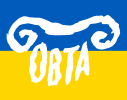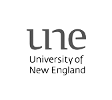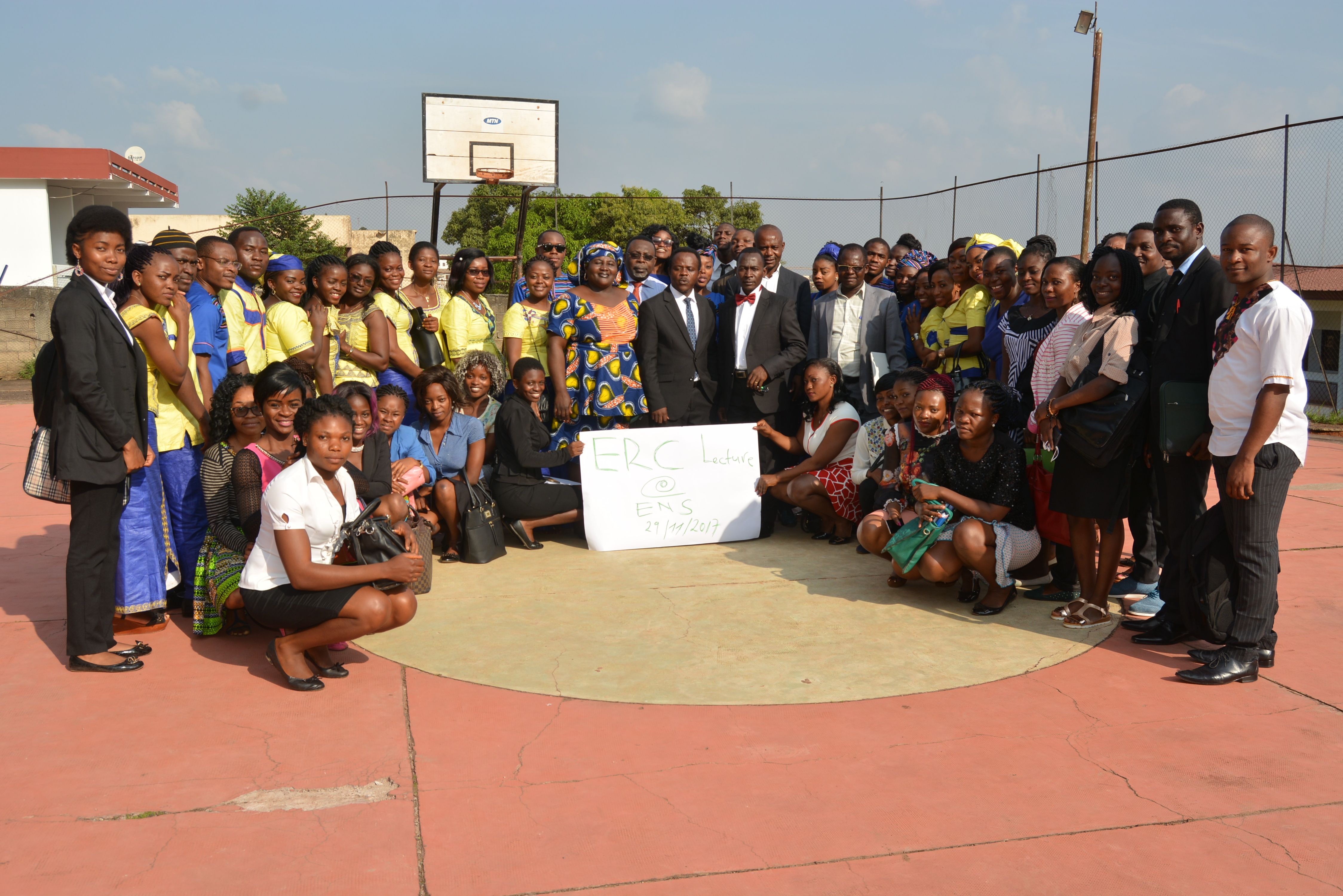March 1, 2017 - ERC-Day @ Ecole Normal Supérieure, University of Yaoundé 1
Report by Chester Mbangchia, email: mbangchi25@gmail.com, reviewed by Prof. Daniel A. Nkemleke
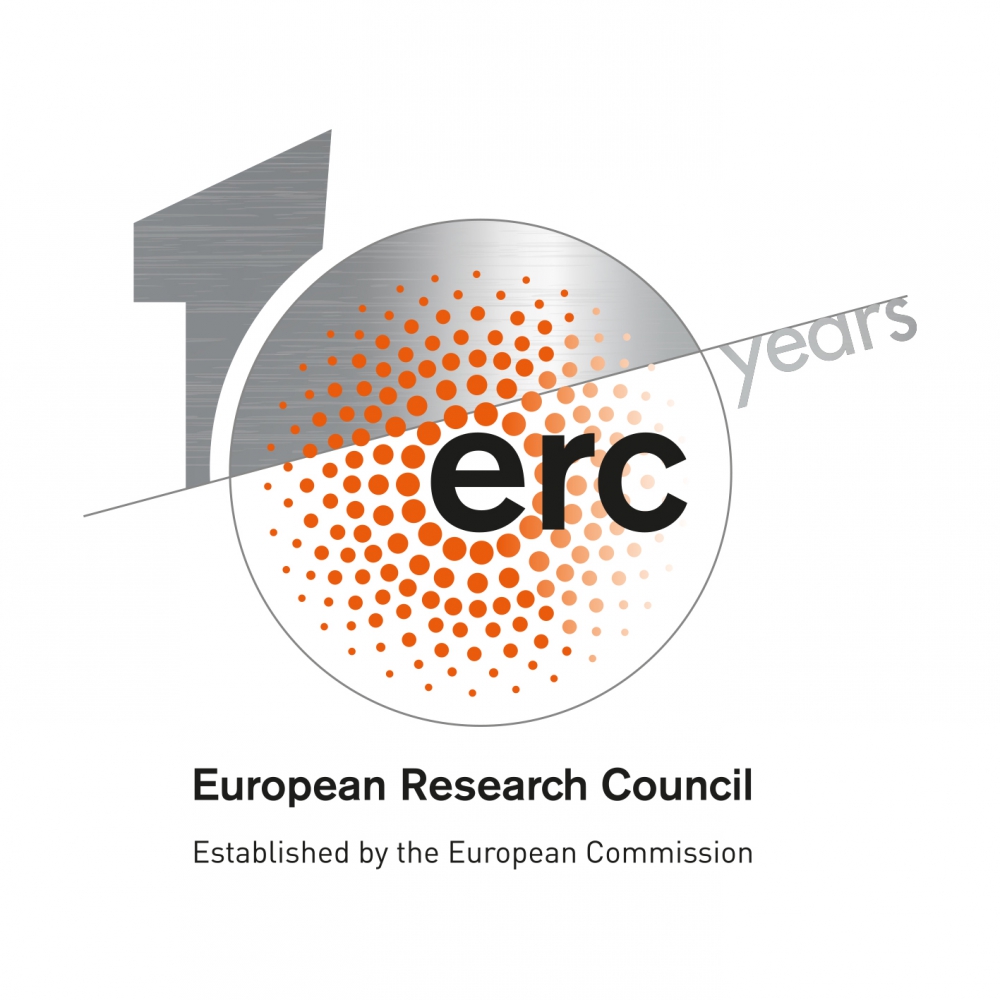 The celebration of the 2017 ERC Day at the Ecole Normale Supérieure of the University of Yaoundé 1 was animated by two talks: one on the scope of funding activities of the ERC with focus on the project: Our Mythical Childhood... (OMC) and the other on mythology, archetypal cross-references with Graeco-Roman heritage and the relevance of myths in young adults’ education. Over a hundred-and-forty attendees from the University stepped away from their different academic activities (classes and lectures) to take part. Prof. Daniel A. Nkemleke and Prof. Divine Che Neba were the speakers of the day. They were pleased to see that over 25% of attendees were students from the departments other than English and literary studies. They came largely because of the publicity that had been made about the event a week before. Although the event was held at the premises of the Ecole Normale Supérieure, staff and students from the adjacent Faculty of Arts, Letters and Social Sciences were also present.
The celebration of the 2017 ERC Day at the Ecole Normale Supérieure of the University of Yaoundé 1 was animated by two talks: one on the scope of funding activities of the ERC with focus on the project: Our Mythical Childhood... (OMC) and the other on mythology, archetypal cross-references with Graeco-Roman heritage and the relevance of myths in young adults’ education. Over a hundred-and-forty attendees from the University stepped away from their different academic activities (classes and lectures) to take part. Prof. Daniel A. Nkemleke and Prof. Divine Che Neba were the speakers of the day. They were pleased to see that over 25% of attendees were students from the departments other than English and literary studies. They came largely because of the publicity that had been made about the event a week before. Although the event was held at the premises of the Ecole Normale Supérieure, staff and students from the adjacent Faculty of Arts, Letters and Social Sciences were also present.
Prof. Nkemleke opened the event with a word of thanks for participants and for students who ran the publicity prior to the event. He gave a brief survey of the European Research Council: its foundation in 2007 and the Horizon 2020 Grant scheme within which the project on the Reception of Classical Antiquity in Children’s and Young Adults’ Culture in Response to Regional and Global Challenges is funded. Of special interest to the students present was the possibility that PhD students were being integrated into the Project to write Survey entries, with further prospects to attend some of the future conferences in Warsaw, Poland.
The next speaker was Prof. Neba who inspired the participants with his passion about mythology and issues of identity and appropriation. He started with a brief introduction on classical mythology and its relationship with African mythology. He proceeded with a plea for students to “stop looking for the definition of myths in such dictionaries as The Oxford English Dictionary and The Advance Cambridge dictionary.” According to him, the dictionaries’ definitions of myths are deceptive as they do not tie to the cultural realities of the custodians of myths in the African context. His talk focused on the development of African mythology and in particular, Cameroon mythology, and possible links to classical mythologies, and how mythology is an important factor in the character formation of children and young adults. He maintained that the low status accorded to the study of African mythology was largely due to European colonial influence that had seen African myths as tales, and consequently had sought to study Africa and its culture from the perspective of Western canons of classical mythology. He told the attendees that “If you say you don’t have a myth, a stranger will define you with his own myth. And if such a thing happens, you have lost your identity and have been reduced to a certain type of species, maybe undefined.” His thesis therefore was that mythology could be a strong index of identity formation in children and young adults, one key ingredient for theorizing about peoples and cultures, and a basis for understanding of transcendence.
The talk became even more interesting as attendees looked with their mouths ajar, eager to hear more about their own mythical origins. Prof. Neba continued with the revolution that started with early African writers such as the celebrated Chinua Achebe who wrote counter narratives to holistically present the image of Africa formerly distorted by the West. He talked about the display of African mythologies by authors like Ayi Kwei Armah in his Osiris Rising. What captured so much attention and eagerness of the participants was the long awaited exposition of Cameroon mythology which the presenter had held in suspense. Prof. Neba said that in Cameroon there are myths that define the origin of Cameroonians and myths that clutch the people together. He talked about the female cults such as the “Takengbengs,” “Ekan,” and the male cults such as “Obasinjong,” “Ngele,” “Jengu,” “Mbok Mbok,” and “Ebang Nyankwei.” These cults have been compared to the Western Freemason and Rosicrucian societies by one of Cameroon’s literary artists, Bate Bisong.
The event gained climax with a brief sketch of the mythological map of Cameroon. Prof. Neba maintained that it is complex to classify Cameroon myths due the ethnic and linguistic diversity of the country. Despite this diversity, he classified Cameroon mythology alongside the main language groups of the country. Cameroon mythology comprises the Afro-Asiatic group, whose origin is Egypt, and it is practiced in the West region of Cameroon. Here, he talked about the “Famlah” of the Bamileke people. The “Famlah” focuses on the transmigration of the human soul. Next are the Nilo-Saharan group and the Niger-Congo group. The latter category is made up of the Bantu and the Non-Bantu who concentrate on epic collections, and the “Njang-Sawa” and the “Beti-Fang” in the Centre region of Cameroon.
The event ended with a brief conclusion from Prof. Nkemleke. He said one of the main goals of the OMC Project is to investigate the extent to which common motifs are recurrent in mythologies across the world. So far he said, from the Survey entries that students have written that evidence seems strong, and what that meant was that humanity might have much more in common than what seems to separate them.




